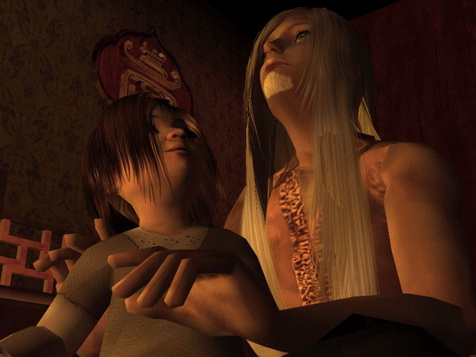
Lasim was a frail and fretful little elf, and his young mother had more trouble with him alone than her sister did with her several children. Bedtime was a nightly battle. Only his grandfather knew the sure trick for calming him: it sufficed to sing.
All his life Imin had heard his beautiful voice praised, but if the Bright Lady herself had stepped out of the sky and begged him for a hymn, it would not have flattered him more than this tiny elf’s rapt attention to his songs.
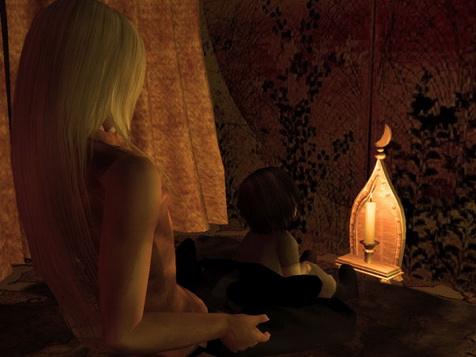
Ever wary of female ears, however, Imin stopped singing when the splashing and banging in the back room ceased. Soon enough his daughter padded into the doorway behind him.
“He can scarcely say twenty words and you’re already trying to teach him to sing,” she scolded in her dovelike little voice.
“A boy’s never too young to learn to sing,” he grumbled. It was the truth, but it was bitter, because few boys ever grew old.
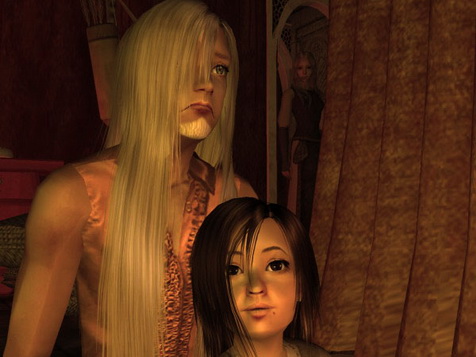
Sina scoffed, “I think he might have been a little too young when you used to sing to my belly.”
“Not by half!” Imin cackled bitterly. It was funny because it used to drive her husband wild. It was bitter because her husband was dead.
Lasim sniffled, and his mother stepped into the room. “You should teach him something useful instead, like wiping his nose.”
She dropped a red cloth over Imin’s shoulder onto the baby’s head, and after teasing him with it for a moment, Imin wiped the guilty nose.
“Better a snot-faced kid who can sing than a clean boy who can’t, eh, Sim? And since you’re already snotty…”
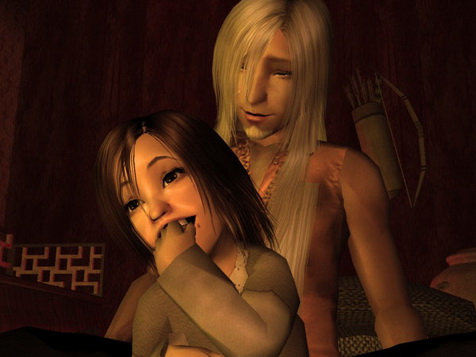
He swiped at the baby’s head playfully, and Lasim laughed without understanding. Sina laughed too, understanding no better.
Lasim was not only snotty, he was sick, and neither Imin nor his wife could bear to tell his mother. Sina was not strong herself, and Llosh would never have another son.
As soon as Sina turned her back, Imin bent his head and kissed and kissed the dark hair. Lasim laughed, thinking it a game.
“You think singing isn’t useful,” Imin growled over his shoulder at his retreating daughter. “I want this boy to learn, Sisi. Maybe when he’s big, our people will know the need for poets again.”
“The luxury, you mean,” Sina sighed as she shuffled through the doorway.
“Poetry is not a luxury!” Imin called after her. He bent his head to the boy’s again and whispered, “It’s like food, little Sim. Our people are starving.”
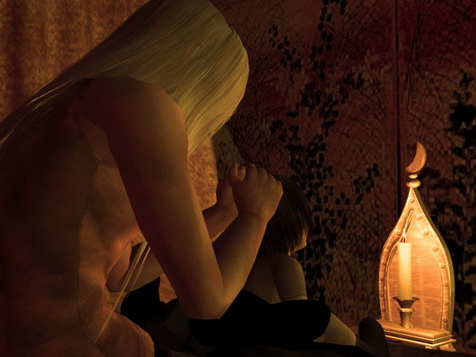
He curved his arms around his grandson and began to sing again, crooning softly into the boy’s silky hair: not a song sacred to his people, which he could not have sung before his daughter, but a song sacred to himself, which he could not sing before his wife.
Still wary, he let his voice fall off to a whisper when he heard a boy’s feet come thumping heedlessly down the corridor outside. They passed Sina’s door and seemed to continue as far as Imin’s own.
Imin whispered the last words of a verse and fell silent. Su had stayed in, so he knew it would be Vin coming home late.
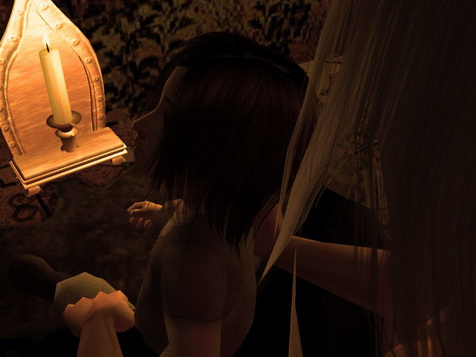
He grit his teeth and began stewing up his anger. His wife would be furious to hide her fear, and she would likely drag the boy as far as Sina’s door so that he could be promptly and properly scolded by his father. Imin would have to be violent to hide his gratitude that his son had come home at all.
His anger had only just begun to simmer when Vin clattered back down the corridor and through Sina’s door. The curtains puffed out and fluttered back again, leaving Vin behind like the panicked rabbit in some oversized magic trick.
He flung out his arms and squealed, “Daddy!”
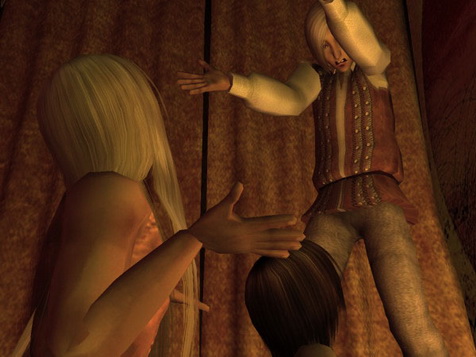
Imin quickly went over the inventory he had tallied every day since the boy’s birth: all the limbs were there, all the digits; the face was unmarked and symmetrical; and there was no sign of blood or wound.
“What is the matter with you?” Imin howled. “You about kicked the baby in the head! Where’s your mother?”
“Daddy! Mash and Surr are killed! Dead!”
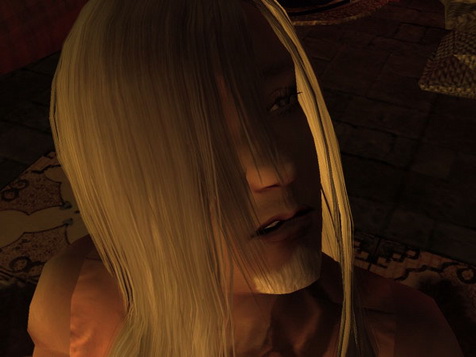
Imin’s breath hissed slowly out of his lungs until they were empty. He no longer shrieked or squealed like his son. He no longer roared in public or sobbed in private like Lar. This deflating breath was all he had left: scarcely a sigh.
Vin dropped to his knees and howled at the heavens, as his father had once had the strength to do: “My best friend! With an arrow in his eye!”
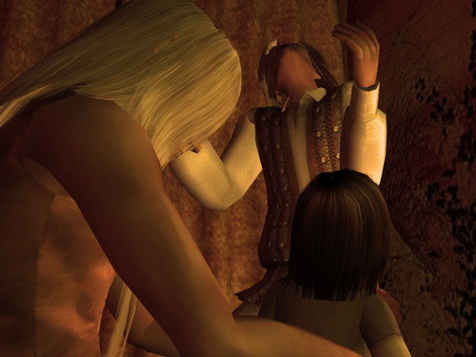
“I could almost thank the elf Dre,” Imin muttered. “For sparing Dasi this.”
“But—Dad!” Vin squeaked, stunned by his father’s impassivity.
“Where’s Zem?”
“I don’t know—he went home—but, Dad!”
Then Sina’s dovelike little voice cooed fearfully from the doorway, “What happened?”
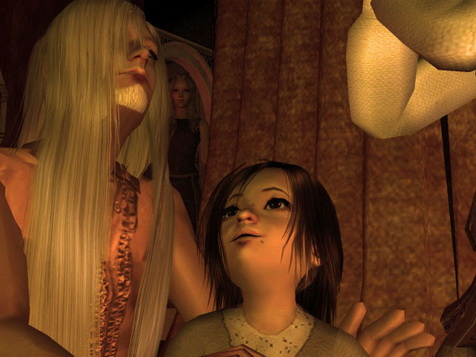
Imin’s temper had found its one fair target. “Oh, that’s right!” he exploded. “I was just thinking, ‘What’s missing here? What am I missing?’ Just a female to come along, with her ‘What happened? What happened?’”
He hopped up and carried Lasim over to his mother, holding him away well from his chest as if the frail little body and the snotty nose had suddenly grown distasteful to him.
“You take this baby and go to your mother, and stay there till I kick you out, or till you grow enough sense to keep your gaping mouth shut! And you!”
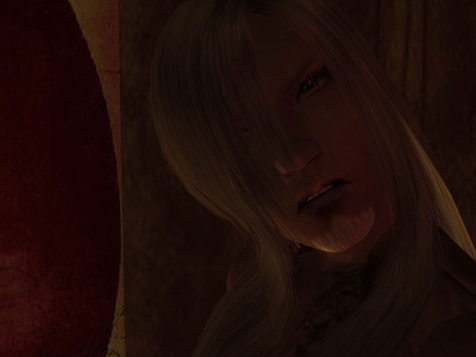
He spun around and crossed the room again in one swoop of arms and legs. He thrust his hands beneath his son’s armpits and hauled him to his feet with as much apparent disgust as he had had for his grandson a moment before.
“Quit your bawling! What happened? Are you hurt?”
“No…”
“Then quit that bawling!” Imin cried, louder than ever now that he knew his son was safe. “What happened?”
“Some girls came,” he blubbered, “and we split up—”
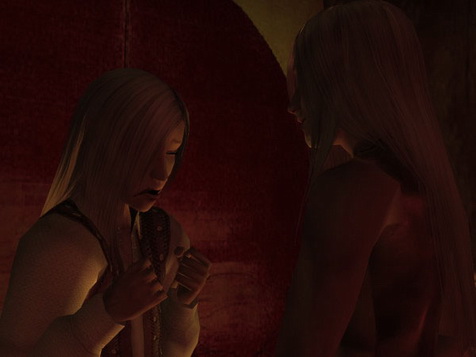
“Girls!”
“And when we went back, they were dead! Mash had an arrow in his eye, and Surr had one stuck in his throat, and—and they were just lying there…”
“Where?” Imin barked.
Vin quavered, “Across the lake…”
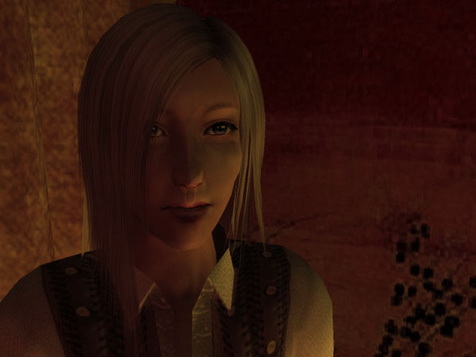
Imin kicked the wall in frustration at their stupidity for having gone so far. “Stinking, spewing Mother! Where are they now? Where did you take them?”
Vin’s mouth trembled, but he said nothing.
“Tell me you didn’t leave them there,” Imin growled.
The trembling mouth opened to protest, but Vin had nothing to say.
“Now some other elf is going to have to go back and get them—did you idiots think of that?” He roughly shoved the boy’s shoulders once, and again as soon as Vin straightened. “Now I’m going to have to go back to get them, for Dasi’s sake—did you think of that?”
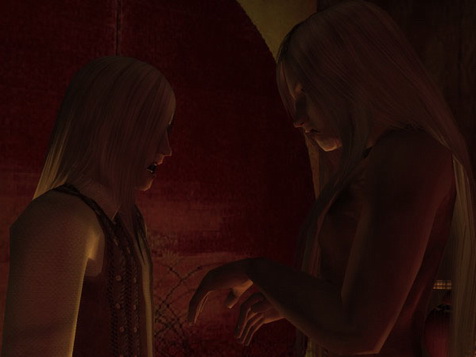
Imin stalked away to slap the far wall and back again to kick the near, livid with his overboiling anger.
“If your father dies tonight, you have your idiot self to thank!”
Vin whispered, “I’ll go…”
“No you won’t! Such stupidity as yours doesn’t get rewarded twice in a night! You’d be killed for sure! And then I’d just have to go get your body anyway, and—”
Imin gasped, his lungs abruptly inflating themselves. Such a crushing pressure in his chest could only be counteracted by another. He grabbed his boy with both arms and pulled him violently against his body.
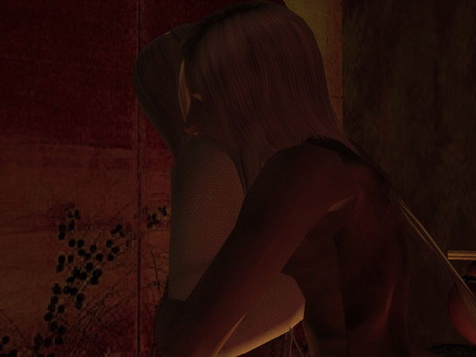
He trapped Vin’s arms against his chest, holding him as helpless as a baby for a moment. He burrowed his face into the boy’s hair until he found the sweaty strands that lay against the neck, and deeper still until his lips found the sweaty neck itself. The soft skin still had the sweetness Imin remembered from the days when the baby’s cheeks had been so fat that the young father could scarcely wedge his face between the head and the shoulders to deliver his hungry kisses.
Imin knew he would never carry his son’s body home. Wherever he found it, there he too would die.
He pushed Vin’s hair back out of the sweat and tears of his face and whispered, “You better get used to carrying your best friend’s body home on your back. It won’t be the last time.”
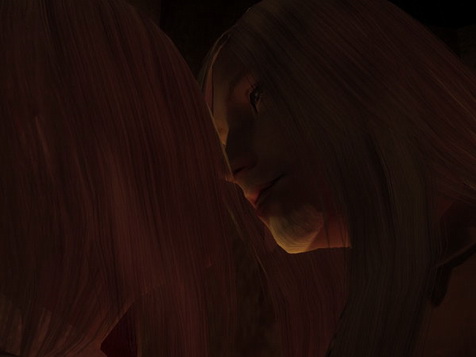
“Yes it will,” Vin sniffled. “I won’t have any more best friends, ever.”
“Then you might as well die right now, boy,” Imin sighed. “What else are you going to live for? Your own stupid little self? Love no one except yourself? You want to be like Lar?”
Vin’s head had only just settled comfortably on his father’s shoulder when the mention of Lar caused it to snap up again. “Those girls said Lar has a son. And Surr said you told him and Mash about it.”
Imin’s lip curled into such a vicious snarl that he could almost feel fangs in his mouth.
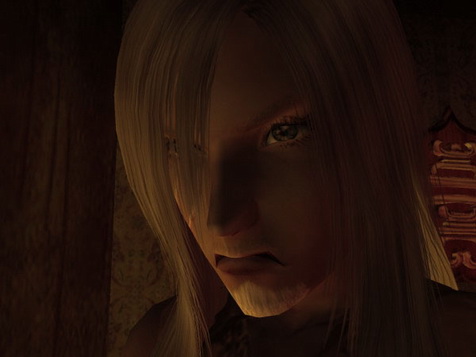
“Let me tell you a few things you don’t know about Lar,” he growled. “He does have a son—an ugly little half-breed son—but not with his wife—with a woman!”
Vin’s own lip curled up in faint, disbelieving disgust.
“He thinks his blood’s so good he can dilute it with a woman’s—but ours is so filthy he won’t have a son with one of our ladies! Not even the elf Zevadra—Dasi’s own sister! Your best friend’s aunt!”
Vin winced and looked away as if the idea caused him pain—not for Zevadra’s sake, but for Lar’s, or for his idea of Lar.
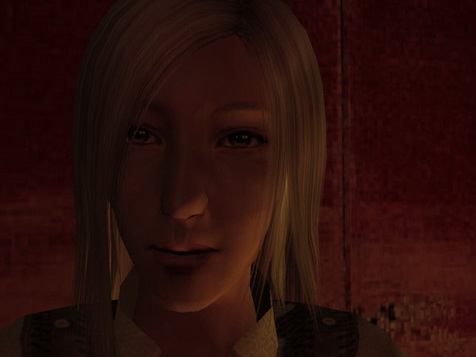
But Mash was dead: Imin decided it was the moment to poison every sneaking tendril of affection for their haughty leader that might have curled from Mash’s heart into his best friend’s.
“And he doesn’t even think our ladies are good enough for the men,” he whispered.
Vin tipped up his face to listen, and Imin poured the poison in.
“He killed the poet Sela because she had a child with a man, but when he had a chance to kill the son he had with a woman, did he? No.”
“I thought the men killed the poet Sela,” Vin whimpered.
“Oh, that’s Lar’s story! That’s what he wants you to believe. But I was there, Vin. I saw with it my own eyes. He killed her. He killed her with his foul magic. Now you know, even if something happens to me. Never forget it, my son. Never let it be forgiven.”
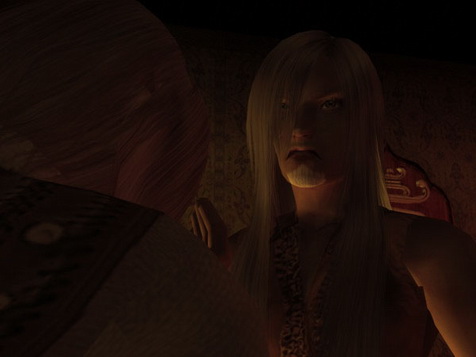






Sign-up sheets for Team Imin are over there *points* in case I won anyone over with this chapter.